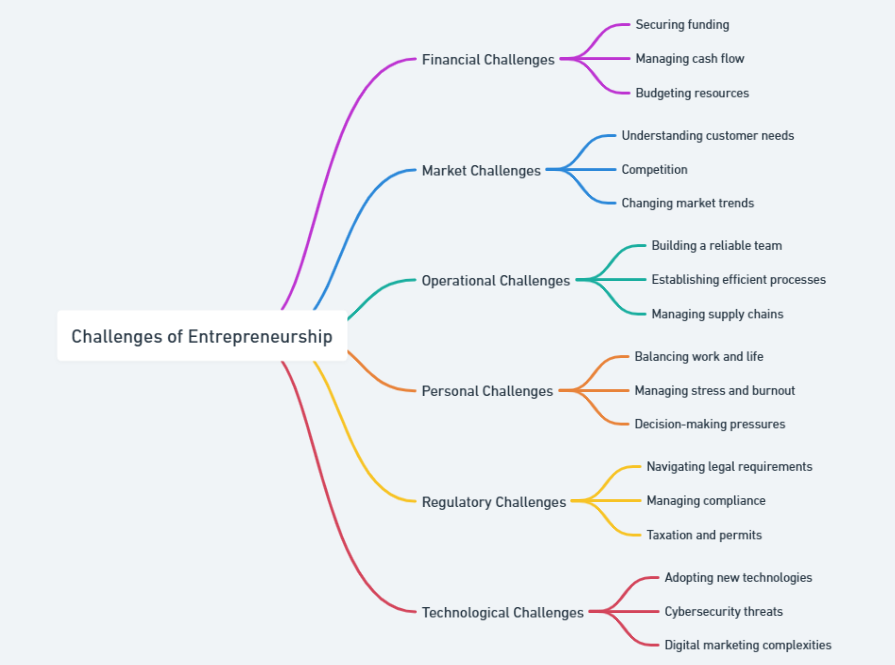Entrepreneurship Then & Now: Tracing Its
Evolution Through Time
Table of Contents

Entrepreneurship is a concept that has been around for centuries, yet its meaning and practice have evolved dramatically over time. The journey of entrepreneurship runs from the markets of ancient civilizations to the current tech start-ups. This shift reflects changes in society, technology, and trends. In the olden days, entrepreneurship consisted largely of traders and artisans exchanging goods and services with others. But today’s evolution of entrepreneurship knows no borders and instead pursues ideas that help to solve complicated problems discovered in the marketplace worldwide.
But what does it really mean to be an entrepreneur today? How have the challenges and opportunities changed compared to other points in history? In this blog, we’re going to answer all your questions and understand the history of entrepreneurship. We will share how culture, finance and technology have all historically impacted entrepreneurial practices and what this means for potential business owners in the 21st century.

*slideplayer.com
The Roots of Entrepreneurship
In order to understand the evolution of entrepreneurship, we need to go back to its roots. The word `entrepreneur’ is derived from the French word `entreprendre,’ which refers to `to undertake.’ Before `entrepreneur’ became a common term, entrepreneurs were merely individuals who risked their capital (money) in order to create value through trade, skill, and so on. In the ancient region of Mesopotamia, in 3000 B.C., merchants were the middlemen of their economy, and they played an important role in trade between regions.
It was through the merchants that some of the first concepts of business practices emerged, showcasing how people can leverage goods and services more than their local communities. While ideas about economic exchanges were discussed by philosophers like Aristotle and Plato in ancient Greece, it was not until the Middle Ages that entrepreneurship began to take form. With guilds beginning to take shape, craftsmen and artisans began to work together to protect their interests, share knowledge, and perfect their craft. The collaborative aspect nurtured new ideas and allowed for better organization of more complex and structured business practices.
The Age of Exploration and Trade
The Age of Exploration of the 15th and 16th centuries was a remarkable change in the evolution of entrepreneurship. Because of their need for finding new trade routes and new resources, European nations financed exploratory expeditions. Entrepreneurs led the way as explorers, navigators, and traders, who brought back exotic items such as spices, silk, and precious metals. The Age of Exploration revolutionized trading networks and introduced new economic concepts, such as Capitalism.
In the origin of entrepreneurship, Mercantilism rose to prominence during the Age of Exploration, emphasizing national wealth and trade. Entrepreneurs started playing critical roles in established economies, influencing political agendas and public policy. The not-for-profit joint stock company–such as the British East India Company — truly combined entrepreneurial thinking, pooled resources/limited risk, and modern corporate structures.

*blog.hubspot.com
The Industrial Revolution: A New Era of Entrepreneurship
The industrial evolution of entrepreneurship of the 18th and 19th centuries transformed entrepreneurship in endless ways. All of a sudden, industries began growing exponentially, which increased demand for innovators who could redesign processes and accommodate customer requirements.
The Industrial Revolution saw the birth of factories and mass production and new technological advances that shifted the creation and distribution of goods. In short, entrepreneurs like Andrew Carnegie in steel and John D. Rockefeller in oil began solidifying wealth into vast empires rather than local pockets of affluence.
They created concepts like vertical integration and monopolies, thinking significantly bigger. It was during the Industrial Revolution that entrepreneurs and entrepreneurial experience were defined by size and wealth accumulation.
While the Industrial Revolution brought immense opportunity, it also brought immense challenges. Conditions for work during much of the Industrial Revolution were unacceptable, and they contributed to social unrest and the development of labor movements across the world.
Unfortunately, this evolution of entrepreneurship was viewed with increasing skepticism, since while unfair inherent advantages allowed industrialists to amass fortunes, this same success allowed the gap between the rich and the poor to widen. The Industrial Revolution allowed the conversation of whether or not business had a moral obligation to serve as a positive force to unfold – a conversation that we still contend with today.
The Rise of the Middle Class
As industries flourished, a middle class began to emerge, leading to a shift in consumer behavior. People had more expendable income and sought out new products and services. This increase in demand created opportunities for smaller entrepreneurs and thus the rise of retail and service businesses.
Rather than just considering the evolution of entrepreneurship as corporations or large organizations, entrepreneurial activities began to include smaller business owners and independent operators.
Beginning in the early 20th century, individuals such as Henry Ford not only changed production methods but also altered the manner in which businesses functioned. Ford introduced the assembly line, which reduced production costs and time. Ford’s vision and approach made motor cars affordable and accessible for the masses while emphasizing how innovation can lead to entrepreneurship.
The Tech Revolution and Startups
The end of the 20th century saw the advent of the digital age and a change in the way we think about entrepreneurship. The internet and the development of technology laid the groundwork for both new opportunities and new problems.
Entrepreneurs such as Steve Jobs and Bill Gates became well-known figures leading innovations that created extraordinary wealth. Environmental factors such as the tech boom led to the explosion of innumerable startups, effectively transforming entire industries and creating new ones.
Silicon Valley emerged as the center and front-runner in this entrepreneurial climate; more than simply a locale, it became a source of inspiration for young innovators who could begin with an anti-establishment idea and scale into an ideology of rapid growth and experimentation. The startup culture has come to symbolize many values, including speed, creativity, density, an anti-establishment learn-to-grow mentality, and risk-taking.
The cost to become an entrepreneur was lowered considerably as technology enabled someone to start a business for very little. On the contrary, this evolution of the concept of entrepreneur with the digital age brought challenges as well. The rapid pace of change encouraged businesses to adapt, and many startups encountered intense competition. There was a heavy emphasis on rapid growth, which meant solutions to those challenges were given little consideration even though intense competition raised questions about the sustainability of their business models.
Entrepreneurship in the 21st Century: Challenges and Opportunities
Today, entrepreneurship is more inclusive and attainable than at any time in the historical development of entrepreneurship. Because of our digital world, it is now possible for anyone, of any background, to follow their passion and create a business. E-commerce, social media, and online platforms have made entrepreneurship accessible and given everyone, regardless of their idea, a chance to reach global audiences.

*plutuseducation.com
Similarly, the challenges of contemporary entrepreneurship are real and substantial. Competition is intense, and creating differentiation is critical. In addition, we live in a period of significant economic volatility and entrepreneurial challenges resulting from changes in regulation and shifts in consumer preferences, to name a few impediments.
The Importance of Social Entrepreneurship
One of the most notable trends in contemporary entrepreneurship is the rise of social entrepreneurship. Many entrepreneurs today are genuinely interested in making a real difference in the world. They pursue their purpose of solving important social, environmental, and economic issues by building sustainable, profitable businesses. This shift is indicative of increased awareness of the part that businesses have played, and can play, in society. Social entrepreneurs are concerned with purpose as much as profit and are tackling the most significant challenges of our time, including climate change, poverty and inequality. This new style of entrepreneur is redefining the parameters of traditional business and advocating for a much more socially responsible model of entrepreneurship.

*smefutures.com
The Future of Entrepreneurship
As we move forward, the field of entrepreneurship will be a dynamic environment. Emerging technologies like biotechnologies, artificial intelligence, and blockchain have the potential to create new industries and redefine existing ones.
Entrepreneurs who understand how to apply these emerging technologies will be well-positioned to prosper. Furthermore, the next generation of entrepreneurs will also be shaped by the growing importance placed on sustainability and social impact. Consumers are becoming more conscientious of how they spend their money, and companies that are dedicated to ethical practices will have distinct advantages.
The Role of Education and Support
A key element of an active entrepreneurial ecosystem is to create an education and support system for potential entrepreneurs. Programs that educate business skills, financial literacy, and innovation apply to individuals’ capacity to use their skills in pursuing entrepreneurial paths. Critical recommendations and networking opportunities provide newcomers with basic fundamentals for beginning and operating a business.
Conclusion
The evolution of entrepreneurship is a reflection of an ever-evolving planet. From ancient traders to modern technology innovators, entrepreneurs continually push the boundaries of social change. As we examine the progress of entrepreneurship through history, we find a long narrative of resilience, creativity, and adaptation.
Today’s entrepreneurs face unique challenges and opportunities that ask for a different mindset and skillset. By innovating, pursuing social responsibility and using technology to address the complexities of the tumultuous business environment we live in, there will be a future in entrepreneurship. In this way, those who dare to dream and take risks will continue to lead this journey of the world into the next generation and beyond. In this evolution, the new normal is that the entrepreneurs will shine in the next wave of innovators and impact creators.
If you aspire to become an entrepreneur and seek guidance, Jaro Education can serve as your ultimate destination. We are an online higher education and upskilling company, offering courses in collaboration with India’s top institutions. Explore our online certification courses and degree programs to help you build a successful career as an entrepreneur.
Frequently Asked Questions
What are the 7 functions of an entrepreneur?
An entrepreneur’s main job is to start and run a business. This includes important tasks like finding good ideas, planning how to operate, managing risks, encouraging new ideas, handling money, selling products, and leading a team. They also need to build connections, adapt to changes in the market, and clearly share their vision.
What are the four types of entrepreneurship?
The four main types of entrepreneurship are: small business, scalable startup, large company, and social entrepreneurship. Each type represents different approaches to starting and running a business, with distinct goals and strategies.
Who is the best entrepreneur in India?
It’s hard to pick just one “best” entrepreneur in India because success means different things to different people. However, some of the most well-known and successful entrepreneurs include Mukesh Ambani (Reliance Industries), Ratan Tata (Tata Group), and Falguni Nayar (Nykaa).
How has entrepreneurship changed over time?
In the 20th century, the focus shifted from big companies to small businesses and startups. With the rise of the internet, entrepreneurship evolved even further, leading to the growth of e-commerce and tech startups.

















